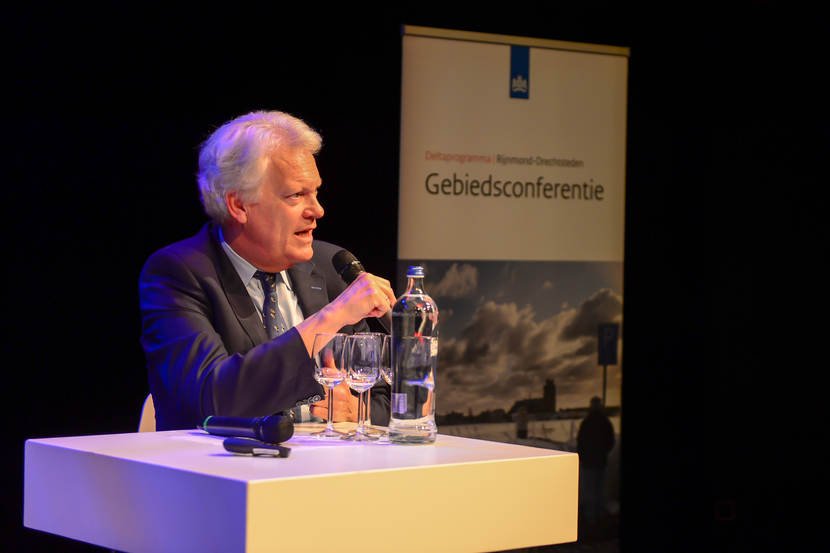Area conference in Rhine Estuary-Drechtsteden
The biennial area conference of the Rhine Estuary-Drechtsteden Delta Programme on 4 June was attended by some 180 stakeholders. Among this year’s guests was the Delta Programme Commissioner. The area conference focused on sharing information on the progress made with the preferential strategy for the Rhine Estuary-Drechtsteden area and stressing the importance of collaboration; the partners need one another to implement the preferential strategy and to examine whether the preferential strategy needs to be adapted in the light of the latest insights and developments.

The conference was opened by Mr Aboutaleb, Chairman of the Rhine Estuary-Drechtsteden Regional Consultative Body and Mayor of Rotterdam. He highlighted the transitions within the Rhine Estuary-Drechtsteden area, such as the energy transition and the climate adaptation of spatial planning, and the importance of collaboration and national coordination in this respect. Resilience and the incorporation of adaptive capacity are vitally important. Following a short film on the progress in the area, Rhine Estuary-Drechtsteden Delta Programme manager Ina Konterman explained the most recent developments.
Subsequently, three members of the Regional Consultative Body - Ria Boere (Alderwoman of the municipality of Krimpenerwaard), Hans Oosters (Chairman of the Schieland en de Krimpenerwaard district water control board), and Rik Janssen (Member of the Zuid-Holland Provincial Executive) – reviewed the actual spatial adaptation efforts that are under way in this region. The administrators turned the spotlight onto Catherine Visser, Mark Elkerbout, and Marjolein Pijpers on account of their good initiatives in this field.
After an explanation by Peter Kuipers Munneke (weatherman and glaciologist) regarding the latest insights into climate change, two innovative examples were presented: a mobilisable flood defence system and a user-friendly wireless sensor to measure water levels.
To conclude the plenary session, Delta Programme Commissioner Wim Kuijken addressed a number of questions on various topics, including the impact of more extreme downpours and a potentially accelerated rise in sea level. ‘Achieving the goals set out in the Paris Agreement is essential for this region. The current flood risk management strategy will hold out at a maximum global warming of two degrees. One could claim that mitigation actually is the best adaptation measure.’ The Delta Programme Commissioner pointed out the importance of factoring in more flexibility into the measures: ‘Designing storm surge barriers with a life span of some 100 years is no longer appropriate to the present time.’ Flexibility facilitates adjustment, according to the Delta Programme Commissioner. ‘Every year, we report on the progress made within the Delta Programme and review where we need to shift up a gear. And every six years, we scrutinise for national and regional indications that warrant adjustment of the preferential strategy.’ In closing, he advised the region to retain its current enthusiasm and collaboration methods – at both the official and administrative levels – and stay on course together.
The plenary session was followed by workshops in which the participants discussed an accelerated rise in sea level, stress tests and risk dialogues, evacuation, citizen participation, and environmental visions.
Rhine Estuary-Drechtsteden programme manager Ina Konterman looks back on the area conference with a great deal of satisfaction. ‘Gathering together with all the Delta Programme partners every two years is very valuable, to review what we have accomplished, but also to look ahead to what we need to tackle collectively in the coming period.’